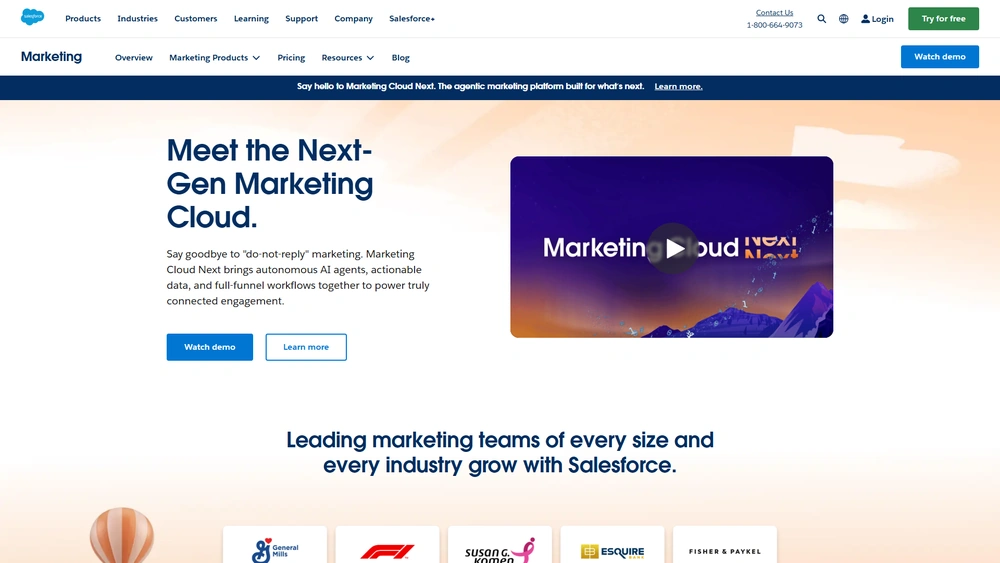Salesforce Marketing Cloud Overview & 2026 Industry Position
Salesforce Marketing Cloud (SFMC) continues to assert its dominance in the digital marketing automation sector. Originating as ExactTarget and acquired by Salesforce in 2013, the platform has evolved into a robust, AI-driven suite designed for omnichannel engagement. In 2026, SFMC garners industry relevance for its deep customer personalization, expanding integration flexibility, and embedded Einstein AI improvements.
With marketing demands shifting toward real-time, AI-authenticated experiences across channels, Salesforce Marketing Cloud has positioned itself at the forefront of scalable automation for enterprise and mid-market brands. The 2025 roadmap emphasizes hyper-personalized journeys, data unification, and ethical-use AI—all pointing to scalable, compliant excellence in engagement marketing.
From Launch to 2026: Salesforce Marketing Cloud’s Journey
Salesforce Marketing Cloud began as ExactTarget in 2000, initially providing email tools for marketers. Key milestones include Salesforce’s $2.5B acquisition in 2013, the launch of Journey Builder in 2014, and significant Einstein AI enhancements in 2019. By 2022, cross-cloud data unification accelerated via Customer Data Platform (CDP) improvements. In 2023–2024, integrations across Slack, Commerce Cloud, and MuleSoft matured, backing what is now a full-cycle marketing suite. The company’s 2026 strategy centers on real-time personalization, trust-centric AI governance, and low-code activation tools democratizing omnichannel engagement even for non-technical teams.

Salesforce Marketing Cloud Key Features
At its core, Salesforce Marketing Cloud offers a multi-module platform loaded with capabilities for modern marketers. Key features include:
- Journey Builder: Visualize and automate personalized customer paths across email, ads, push notifications, and more.
- Email Studio: Advanced email design, testing, and segmentation tools.
- Mobile Studio: Dynamic text, push, and group messaging.
- Advertising Studio: Target custom audiences across Google, Meta, LinkedIn, and others.
- Data Cloud: Real-time CDP for unified customer profiles and segmentation.
- Einstein AI: Predictive scoring, behavior forecasting, and automated content selection.
In 2026, AI Content Builder and real-time personalization across SMS, in-browser, and even Slack channels showcase Marketing Cloud’s advancement into adaptive engagement versatility.
Workflow & UX
Salesforce Marketing Cloud’s UI reflects both its enterprise scale and growing low-code usability. The 2025 navigation bar enables fast access to Email Studio, Journey Builder, Data Cloud, and Einstein Copilot from a single dashboard.
Workflows are now modular, with drag-and-drop functions minimizing IT dependence. Preview modes display user journeys and trigger paths in real time. While the interface still carries a learning curve, 2025 updates prioritize accessibility through onboarding tooltips, in-console support chirps, and AI-powered task suggestions.
Salesforce Marketing Cloud Pricing Analysis & Value Metrics
| Tier | Monthly Cost (USD) | Includes |
|---|---|---|
| Basic | $1,250 | Email, journey builder, cloud data integrations |
| Pro | $3,750 | Multi-studio access, advertising syncs, A/B testing |
| Corporate | $12,000+ | Custom audiences, advanced analytics, Einstein AI, API scale |
Value: While pricing is above SMB range, its scalability, feature volume, and personalization power offer significant ROI for mid-to-large brands needing unified channel engagement.
Competitive Landscape
| Platform | Best For | Notable Differences |
|---|---|---|
| HubSpot | SMBs scaling campaigns | Lower cost, simpler UI, less AI prowess |
| Oracle Eloqua | Legacy B2B outfits | Robust nurture flows, less agile than SFMC |
| Adobe Marketo | Enterprise lead generation | Strong scoring, more complex UI |
While alternatives offer niche strengths, Salesforce Marketing Cloud users get a uniquely extensible and AI-supercharged offering, especially valuable in multicloud Salesforce environments.
Use Cases
Salesforce Marketing Cloud fits diverse verticals. Typical use cases include:
- Retail Commerce: Trigger abandoned cart emails and SMS journeys
- Financial Services: Secure, compliant client outreach across touchpoints
- Healthcare: HIPAA-supportive patient engagement programs
- Travel & Hospitality: Dynamic itinerary updates via channels travelers use
It excels where personalization, compliance, and multichannel reach are top priorities.
Integrations
Salesforce Marketing Cloud boasts over 5,000 integration points through the Salesforce AppExchange, with emphasis on:
- CRM extension via Sales Cloud and Service Cloud
- Slack plug-ins for journey approvals and alerts
- Commerce Cloud synergies for triggers and retargeting
- MuleSoft for custom API mapping
- Social import/export across Meta, X, YouTube
Its integrations are uniquely powerful when part of the Salesforce ecosystem, yet open enough via REST APIs for third-party blend-ins.
Pros & Cons
- Pros:
- Enterprise-grade personalization across touchpoints
- Top-tier AI with Einstein scoring and content suggestions
- Flexible, scalable for high-volume sends and data
- Deep ecosystem integration across Salesforce apps
- Cons:
- Steep learning curve for new marketers
- High cost barrier for SMBs
- Support responsiveness varies across packages
Pro Tip: Use Einstein Predictions to segment beyond demographics—target based on likelihood to convert or unsubscribe for smarter automation.
Final Thoughts
Salesforce Marketing Cloud serves as a powerhouse for enterprise marketers aiming for omnichannel, real-time personalization. Best suited for retail, healthcare, finance, and tech-driven industries, it excels where integrations, compliance, and scale matter. However, its complexity and price may deter smaller teams. With 2025’s updates focusing on low-code tools and AI transparency, it’s more accessible than ever—yet still best fit for serious strategies and sizable lists.
Salesforce Marketing Cloud FAQ
While powerful, its pricing and complexity make it more suitable for mid-size to enterprise organizations.
Einstein AI helps with predictive scoring, next-best action suggestions, automated segmentation, and optimization for subject lines and send times.
Yes. It includes tools for consent management, data portability, and secure storage in compliance with GDPR and CCPA.
The platform offers real-time dashboards, campaign attribution, email metrics, journey analytics, and Einstein insights for behavior forecasting.
Depending on use case complexity, onboarding can take from 1 week (for email only) to 6–8 weeks for full studio use and integrations.

